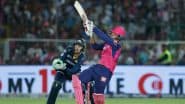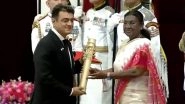New Delhi [India], April 28 (ANI): The saga of the 2010 Commonwealth Games (CWG) corruption case reached its conclusion when a Delhi Court formally closed the Enforcement Directorate (ED) investigation into alleged money laundering tied to the event.
The court approved the ED's closure report, marking the end of a prolonged inquiry that had spanned years.
The case had initially drawn attention due to accusations against Suresh Kalmadi, the former Chairman of the Organizing Committee, and Lalit Bhanot, the then Secretary General, along with others. Allegations centered on financial irregularities in awarding and executing two major contracts related to the CWG. These contracts were said to have caused undue financial gains to certain entities, while inflicting losses on the Organizing Committee.
Special Judge Sanjeev Aggarwal, while accepting the ED's closure report, observed that the alleged offense under Section 3 of the Prevention of Money Laundering Act (PMLA) could not be established due to the absence of proceeds of crime.
Also Read | Gold Rate Today, April 28: Gold Prices Drop INR 1,000 to INR 98,400/10 gm Amid US-China Trade Deal Optimism.
Furthermore, no scheduled offense, as defined under Section 2(1)(y) of the PMLA, was found to have been committed. The evidence on record clearly indicated that no act of money laundering, as outlined in Section 3 of the PMLA, 2002, had occurred.
The judge noted that despite thorough investigations by the ED, the prosecution was unable to substantiate any offense under Section 3 of the PMLA, which is punishable under Section 4 of the same Act. Consequently, there was no justification to continue with the present ECIR (Enforcement Case Information Report). As a result, the court accepted the closure report submitted by the ED.
Years earlier, in 2016, a special court had accepted the Central Bureau of Investigation's (CBI) closure report in a related corruption case. That case involved officials from the Central Public Works Department (CPWD), Delhi Development Authority (DDA), and a private firm, among others.
The CBI had concluded that evidence collected during its probe did not substantiate the allegations against those named in the FIR.
The CWG corruption scandal had sparked a political uproar in India, leading to multiple criminal and money laundering cases.
Special Judge Sanjeev Aggarwal, while accepting the ED's closure report, noted that The ED's probe had been initiated based on the CBI's findings, which alleged that contracts for Games Workforce Service (GWS) and Games Planning, Project and Risk Management Services (GPPRMS) had been awarded in a wrongful manner.
This allegedly resulted in undue financial benefits to a consortium involving Event Knowledge Service (EKS) and Ernst and Young (E&Y), causing a loss of Rs 30 crore to the CWG Organizing Committee.
Ultimately, the CBI itself filed a closure report in 2014, stating that no incriminating evidence had surfaced during its investigation. With both agencies unable to substantiate the allegations, the curtain finally fell on one of India's most controversial corruption cases. (ANI)
(This is an unedited and auto-generated story from Syndicated News feed, LatestLY Staff may not have modified or edited the content body)













 Quickly
Quickly












